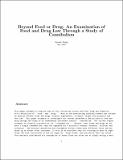| dc.description.abstract | This paper attempts to explore some of the limitations within the Food, Drug and Cosmetics Act's definition of "food" and "drug". Much of the preexisting scholarly debate has focused on hybrids between foods and drugs, dietary supplements, vitamins, weight loss products and the like. This paper attempts to investigate our current problematic definitions of food and drug through the study of an unabashedly unorthodox subject: cannibalism. Our current regime attempts to classify a product by its “intended use.†However, many foods and drugs do not have a single intended use; they are ingested for a myriad of reasons, economic, cultural and religious. And because cannibalism has throughout history taken many different forms and has shown up on almost every continent, it acts as an excellent lens for focusing on what we might think the true limitations of the Act might be. Often times, the motivation that lay within the cannibals mind behind his consumption of human flesh was often one of simply eating a meal. In other tribes or other instances of history, some cannibals felt that eating people was the only way to treat illness, to prevent aging, cure leprosy or even blindness. However, not all instances of cannibalism fell into these simple acts of consuming a food, or administering a drug. Often times, cannibalism was an act of empowerment, of incorporation and self-realization; something that our FDCA doesn’t address. Arguably, a third category of comestible products must be recognized, one that is connected to our identity, our culture and ethnicity, our religion and our beliefs. Catholics who consume the Eucharist do not do so for its nutrition, nor for its medicinal effects. Native American Peyotists worship peyote and do not inhale it simply as a hallucinogenic drug. And arguably, when an American eats a hamburger or a hot dog or apple pie, he is not simply partaking of a meal, but of his own culture and identity. This paper argues that foods and drugs cannot be confined, limited or defined simply by their compositional, nutritional or medicinal value. There is cultural value to foods and drugs, and it seems reasonable to demand that the law recognize these values. | en |


